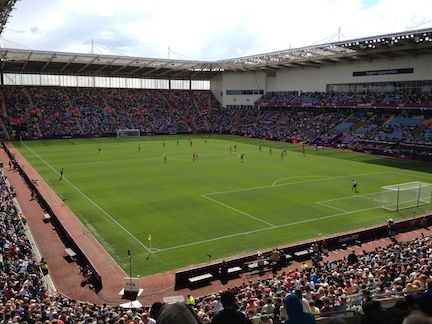
Guest Post by Chris Bolsmann (c.h.bolsmann [at] aston [dot] ac [dot] uk)
After the disappointment of Banyana Banyana’s loss to Sweden (read my post here), I looked forward to the Opening Ceremony of the London Olympic Games and the parade of athletes in particular. The three hour spectacle turned out to be full of contradictions. Danny Boyle provided a fascinating, although selective, history of Britain. He paid homage to the Suffragettes, the National Health Service and immigrants from the West Indies among others, although no reference was made to either slavery or colonialism. I particularly enjoyed his musical selection which included The Jam, Sex Pistols, and The Specials. Watching excited athletes entering the Olympic Stadium can be fun and I was heartened to see Caster Semenya carrying the South African flag.
The lack of visible corporate sponsorship in the stadium and at all Olympic venues is really pleasing to a sports fan’s eye. What a stark contrast to the 2010 World Cup in South Africa where FIFA’s corporate sponsors were visible everywhere. I have yet to come across the Olympics “brand police,” unlike in South Africa where fans wearing Orlando Pirates and Kaizer Chiefs replica shirts emblazoned with the Vodacom sponsor were told to cover them up because MTN — a rival telecom firm — was a national FIFA corporate partner.
Despite the International Olympic Committee’s apparent subtlety, one just has to turn over any Olympic Ticket and the IOC’s “Worldwide Olympic Partners” are clearly visible. The usual suspects appear: unhealthy soft drinks, measly hamburgers and the like, but also a multinational chemical company. Athletes seem unhappy with the restrictions placed on them under the IOC’s Rule 40 protecting official sponsors from “ambush marketing.” Given that athletes can even be disqualified for promoting their individual sponsors, South African swimmer Cameron van der Burgh, Africa’s first gold medal winner, must be cautious since he endorses a range of corporate sponsors on his twitter account which are not “Worldwide Olympic Partners.”
So despite the veneer of a corporate-free Olympic Games, the sponsors and their logos are everywhere. Fizzy soft drinks are even sold as “healthy food” alternatives inside Coventry City’s Ricoh Arena, which has been temporarily renamed the “City of Coventry Stadium” for the Games because the Japanese electronic giant is not an official partner of the IOC. Even the toilets are not safe from the IOC’s attempt at cleansing all traces of rival sponsors. The toilet cisterns and hand dryers have their manufacturer’s names covered up!
I got to watch a double header in this sanitised stadium yesterday as Mexico beat Gabon and South Korea defeated Switzerland. At £20 for a ticket, this represented genuine value for money. Match tickets are cheaper than what Coventry City FC charge in the 3rd tier of English football. The 32,000 seater arena was almost full with 28,000 spectators filling the stands. The empty seats, unfortunately, were the best seats available, those on the half way line behind both substitutes’ benches. According to the IOC, these were seats reserved for their “Worldwide Olympic Partners.” A shame. Besides the fans of the teams on the pitch, there were many families with young children, helped by cheaper youth ticket prices and the Sunday afternoon kickoff time.
As much as I wanted Gabon to silence the Mexican fans’ homophobic chants during opposing goalkeepers’ goal kicks, El Tri were undeniably stronger than their West African counterparts. In an evenly contested first half, Mexico had a couple of good opportunities, but Didier Ovono in the Gabonese goal was equal to the task. The introduction of Giovani dos Santos in the second half gave the Mexicans more creative options up front and he latched onto a long ball in the 62nd minute to put Mexico in front. Giovani sealed the game in the 90th minute after Gabon conceded a late penalty.
Football at the Olympics is different from the World Cup. The kits are different as the German manufacturer is not permitted to advertise their stripes. Football federation logos are replaced by national Olympic associations And for the men, 15 of the 18 members of the team are under 23 years of age. But one just has to look to the corner flags where FIFA has printed its logo and up to the official flags where the IOC’s flag hangs next to that of FIFA. In the end, the corporate interests of the IOC and FIFA merge.
Categories
2 replies on “The Branding and Unbranding of Olympic Football”
[…] Football: Chris Bolmann turns his eye to the ‘branding and unbranding of the beautiful game at the Olympics where he notes “Football at the Olympics is different […]
[…] https://www.footballiscominghome.info/the-hosts/branding-and-unbranding-of-olympic-football/ (footballiscominghome.info) […]